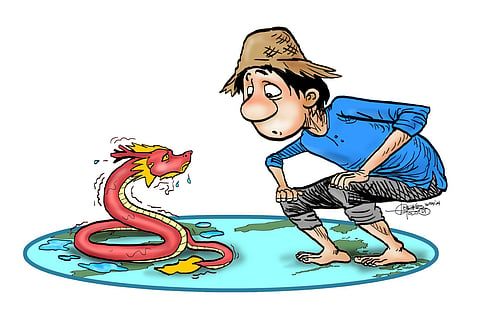
- NEWS
- the EDIT
- COMMENTARY
- BUSINESS
- LIFE
- SHOW
- ACTION
- GLOBAL GOALS
- SNAPS
- DYARYO TIRADA
- MORE

China has taken to Aesop’s fables to express displeasure over the Philippines’ actions defying its unwarranted claims over the West Philippine Sea — playing the victim as in the Farmer and the Viper story.
In a manifesto being circulated in the Chinese military, state propagandists liken the Philippines to the snake that bit the hand of the farmer who nurtured it back to health.
A report by an official of the state-run National Institute for South China Sea Studies falsely claimed the Philippines has been employing detractions regarding the West Philippine Sea issue.
Likewise, it accused the administration of President Ferdinand Marcos Jr. of being influenced by maritime expansionism in asserting its claim over Scarborough Shoal.
The reference to the children’s story was brought about by the agreements struck during the term of former President Rodrigo Duterte who adopted a foreign policy that prioritized appeasing China.
It reminded Mr. Marcos of the friendly consultations and “a tacit understanding and temporary arrangement at the operational level allowing Filipino fishermen in the waters near Huangyan Dao,” which is the Chinese name for the shoal.
The fishing grounds, however, were opened under Beijing’s terms under the observation of its Coast Guard and militia ships.
The Filipino fishermen were placed at the mercy of their foreign “benefactors” the way Beijing wanted the fairy tale to play out.
“Despite deliberate distortions and smears by the Philippines, the fact that a significant number of Filipino fishermen benefit from this arrangement cannot be denied,” it said.
The Chinese declaration, nonetheless, admitted that such an arrangement could not fundamentally resolve the contradictions and differences between China and the Philippines, yet it claimed the agreement had played a positive role in maintaining overall stability amid the maritime conflict.
In the second half of 2023, it recounted that the Marcos administration made both Scarborough Shoal and Second Thomas Shoal its diplomatic priorities, which it backed with “actual maritime and diplomatic actions.”
The report also branded the resupply missions “a pretext to gain territorial sovereignty,” apparently to justify the severe measures taken against the Filipino vessels like strong water cannon blasts.
A warning was issued that if the Philippines continued to “fantasize about staging a Farmer and the Viper scenario,” escalated control and management measures would be taken on Scarborough Shoal and presumably in the other disputed areas.
The measures would include lifting the temporary arrangements to prevent the situation from escalating and avoid a repeat of the 2012 incident.
Beijing thus is preparing to bar Filipinos from fishing in the shoal area which would be in gross violation of the provisions of the United Nations Convention on the Law of the Sea.
The 2012 incident involved the arrest by a Philippine Navy ship of Chinese poachers in the disputed area which sparked a standoff that ended after the late former President Noynoy Aquino ordered the withdrawal of the country’s vessels under an arrangement brokered by the United States.
China, however, reneged on the compromise and did not leave the area of conflict. It later built permanent structures in the area of dispute.
A 2016 ruling of the Permanent Court of Arbitration that China does not recognize affirmed that Scarborough Shoal is within the exclusive economic zone of the Philippines and debunked China’s historic claim to it.
Throughout the discourse, China ignored the ruling while insisting on its invalidated historical claim, which is treacherous considering that it is a signatory to the international pact called UNCLOS.
